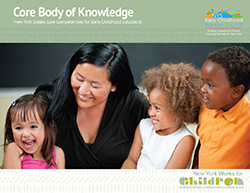
Core Body of Knowledge
New York State's Core Competencies for Early Childhood Educators

5.5
Resources for Competency 5.5:
click to view resource list
Encourages Positive Health Behaviors
The professional working with young children applies practices that encourage positive health behaviors and support the physical and mental well-being of children and families
Resources & Media for Understanding Competency 5.5
Behaviors & Skills
-
aPosts routines and reminders such as emergency plans, hand washing techniques, diapering instructions, etc.
-
bCollects a developmental health history from families for each child that covers topics like physical health, self-care skills, and social relationships
-
cEstablishes good health routines including tooth brushing, serving only healthy foods, and hand washing
-
dMakes drinking water available to children throughout the day
-
eProvides children with at least 120 minutes of gross motor activity (for children attending a full day program) each day through both structured and unstructured play
-
fGives children opportunities to play outside every day
-
gWhen children cannot play outside because of weather or air quality conditions, arranges for indoor gross motor activities
-
hMaintains a quiet, calm atmosphere during rest time for children each day
-
iEnsures that children under 2 years have no screen time (TV, computers, DVDs, etc.) and that children 2-5 years have no more than 30 minutes once a week of high quality, education or movement-focused, commercial free programming, and never during meal or nap times
-
jConducts daily checks of children's health and emotional well-being
-
kModels acceptance, helps children understand similarities and differences among people, and how to interact with all kinds of people
-
lRecognizes the importance of a child's secure home base, and facilitates families' access to applicable resources for consultation about nutrition, emergencies, diagnoses, treatments and other information
-
mCreates a psychologically safe environment for all children and families
-
nExplains reasons for health-related rules to children
-
oCommunicates with families each day about how their child ate, drank, slept, behaved, and voided, particularly in infant/toddler settings
-
pCreates a mutually respectful environment, and encourages families to ask questions and express concerns
